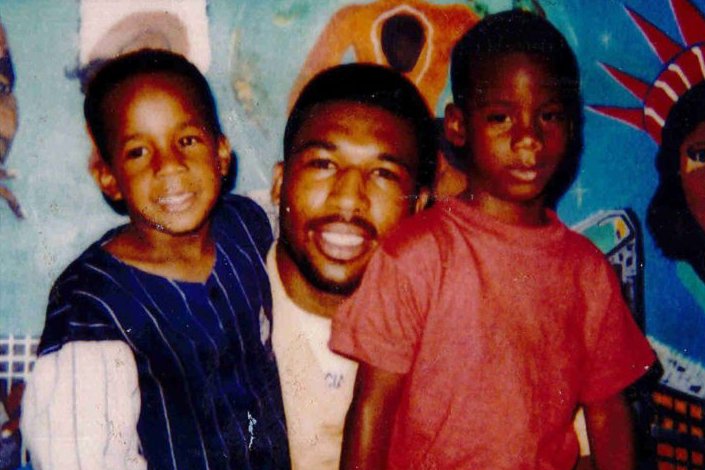
August 23, 2016
 Contributed photo/innocenceproject.org
Contributed photo/innocenceproject.org
In this photo taken in 1991, Anthony Wright, center, is pictured with his son Anthony Wright Jr., left, and his nephew, who was not identified. On Tuesday, Aug. 23, 2016, a jury found the older Wright not guilty of charges stemming from a 1991 rape and murder in Philadelphia's Nicetown neighborhood. Wright previously had been found guilty of the charges in 1993 and served more than 20 years in prison before DNA evidence linked the crime to another man, and Wright was granted a new trial.
Jurors spent less than two hours Tuesday afternoon to find a Philadelphia man not guilty in the retrial of a rape and murder case that originally cost him more than two decades in prison.
Anthony Wright, 44, was sentenced to serve life without parole after he was convicted of killing Louise Talley, his 77-year-old neighbor, in her Nicetown home in October 1991 until new evidence and help from the Innocence Project of New York pointed to someone else as having committed the murder.
New technology was able to prove that the DNA found on Talley's body belonged not to Wright, but to Ronnie Byrd, a former Nicetown resident who was addicted to crack cocaine and died in prison when he was 62, The Inquirer reported.
The District Attorney's Office allowed for Wright's retrial in 2014.
In the retrial, Assistant District Attorney Bridget Kirn based her case on Wright's statement to police – as she repeatedly has done throughout various court proceedings in the case – and claimed Wright confessed to the rape.
Wright told the court that he did not confess, but was pressured by officials to sign documents that led to his imprisonment, though the detectives who were present – but have since retired – denied the claim.
The not-guilty verdict comes after much delay as prosecutors discovered new evidence.
The story has received national attention, from regular coverage of the trials, to questions of how the city's district attorney office could have let this happen.
Though there's no word on how Wright and his family are feeling today, they've shown support and hope through the years-long process.
This past Father's Day, Wright penned a letter about his son which was published on The Innocence Project's website. In it, he credited his son, who was 4 years old when the incident happened, as a large part of why he keeps going.
In it, Wright said:
"He used to come see me when he was a little boy. When he was here, he would stare at me. He would barely blink. He just kept his eyes on me. There was a vending machine in the visiting room. He would go to the vending machine, but he would walk backward so that he could keep his eyes on me. He was afraid that if he turned away, I wouldn’t be there when he turned back around.
The bond that we share is beyond anything that I could have ever imagined. Over the course of 24 years, he’s never wavered, he’s never stopped believing in me.
I get up every morning because of him."